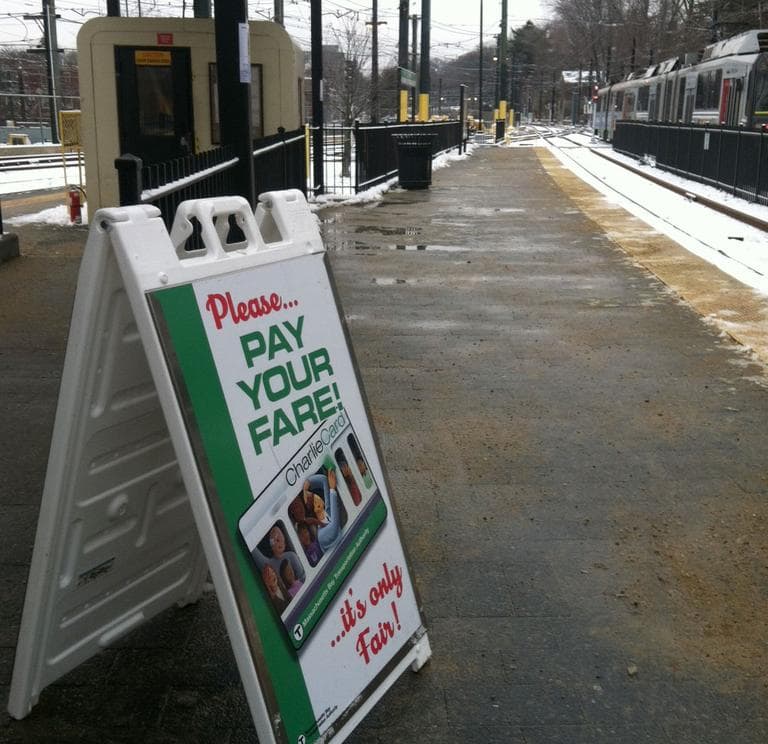Advertisement
MBTA Takes Steps To Prevent Fare Evasion
ResumeThe Massachusetts Bay Transportation Authority is trying out a new pilot project to help chip away at its mounting debt. The MBTA hopes to earn back lost revenue by cracking down on freeloaders through what it's calling “fare blitzes.” These blitzes, which started a few months ago, are held at above-ground stations on the Green Line where it’s easiest to catch a free ride.

“I’ll admit, I’ve been guilty of that,” says Kelly Barry, as she watches MBTA personnel in bright orange vests ask dozens of passengers to prove they have enough fare to ride the T on a recent bitingly cold morning.
Her CharlieCard checked out this time, but she says lots of people board the T without paying for their trip.
“There are a lot of people who take advantage of, like, the morning rush hour or even the evening rush hour and just hop on,” Barry says.
“That’s the culture that has to change,” says Paul Regan, the executive director of the MBTA Advisory Board, which represents area communities served by the T.
There aren't hard numbers on the total amount that’s lost due to unpaid fares, but Regan estimates it’s probably a few million dollars a year.
He thinks most of the fare evasion occurs at above-ground stations on the Green Line where the fare blitzes are taking place. Regan says the blitzes are a good start, but he thinks it will take more than a few random checks at a handful of stations to really change things.
“You don’t want to give the impression that there are waves of enforcement,” Regan says. “You want the impression to be that you are going to get caught because that’s the only way we’re going to keep fares at a reasonable level.”
Regan says watching some passengers catch a free ride aggravates those who do pay — especially at a time when the MBTA is considering increasing fares to narrow a projected deficit of $161 million for next year.
Evolving Enforcement Process
The blitzes don’t cost the MBTA anything except some work productivity. Allison Sweeney is an administrative assistant for the MBTA who was asked to give up a couple of hours a month of her regular job to work blitzes.
When passengers are stopped, she says, “They’ll tell you up front that they have to load their card or that they’re going to pay on board.”
Since starting these blitzes, the MBTA has found that nearly one in 10 passengers stopped didn't have sufficient fare. But the blitzes are aimed at encouraging patrons — not punishing them.
“This just reminds our customer that they should be paying their fare. And we think being visible out there would help people think twice before they would decide to use our system without paying,” says Jonathan Davis, the T's general manager.
Most of the MBTA personnel working the blitzes don't have the authority to issue tickets. So the MBTA is also insisting that passengers board only through the front-door during peak hours to keep people from slipping past drivers without paying for their trip.
It has also deployed both plainclothes and uniformed transit police officers to issue tickets for fare evasion at high-traffic stations. Davis says he's working to bring in more enforcement and tougher deterrents to keep people from cheating the system — including raising the ticket fine from $15 to $75 for a first offense.
“I think, continue reinforcement through these fare blitzes," Davis says, “and then for those who don't get the message, [there are] the fines, and a higher fine.”
He says it's an evolving process. The blitzes are just part of the plan to prevent fare evasion and get the MBTA on track for financial viability.
This program aired on March 8, 2012.